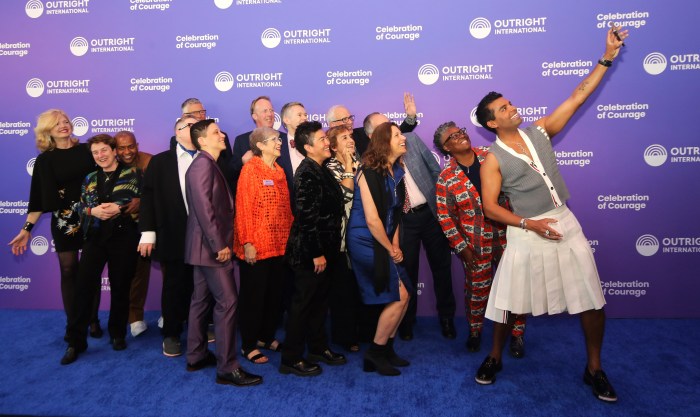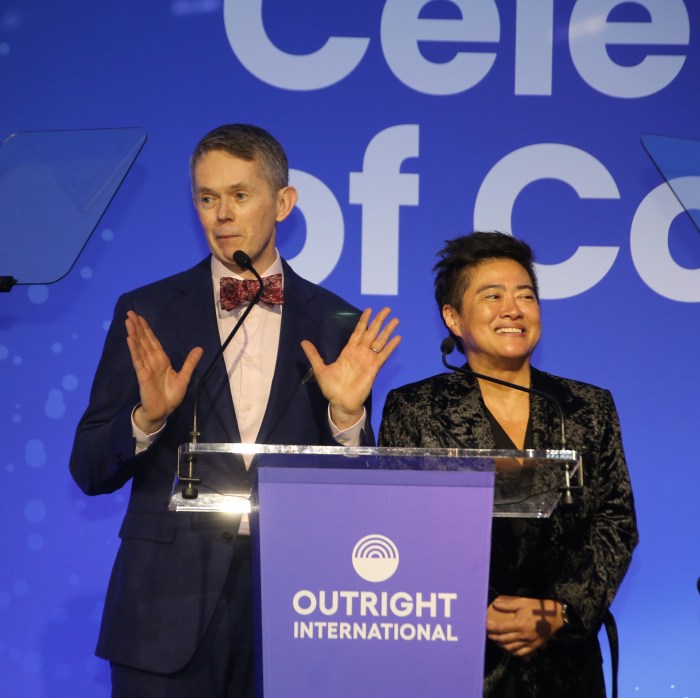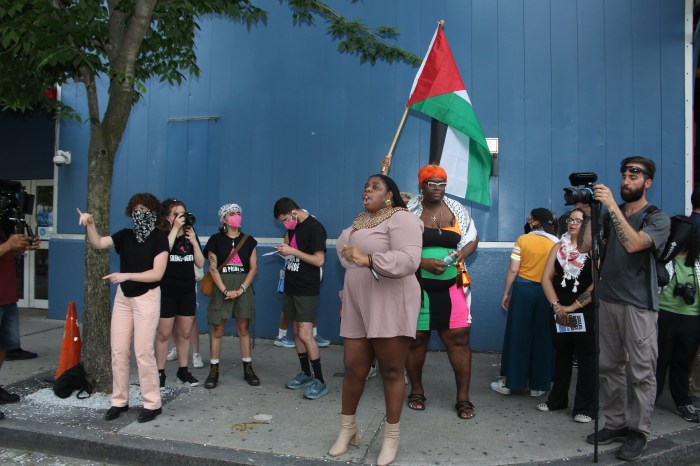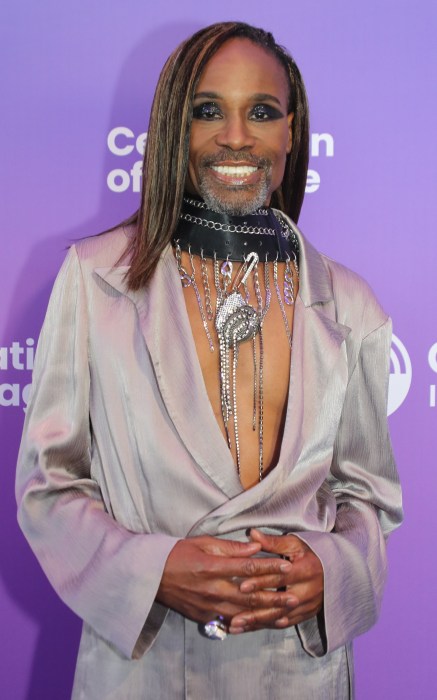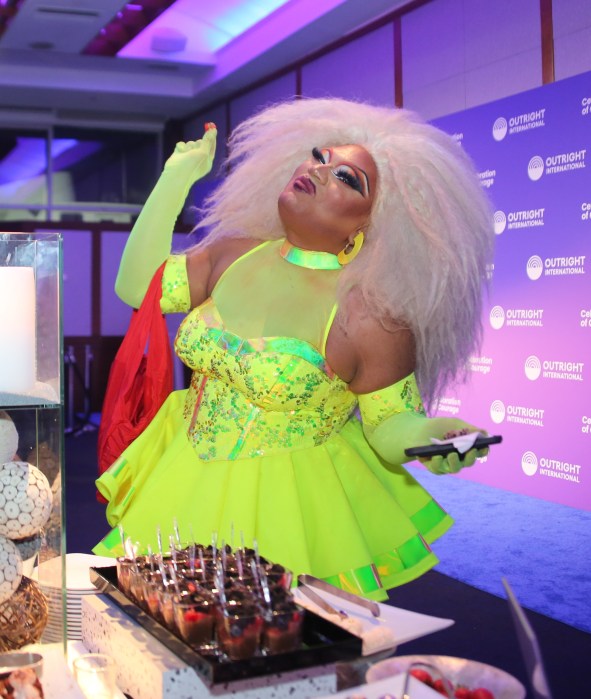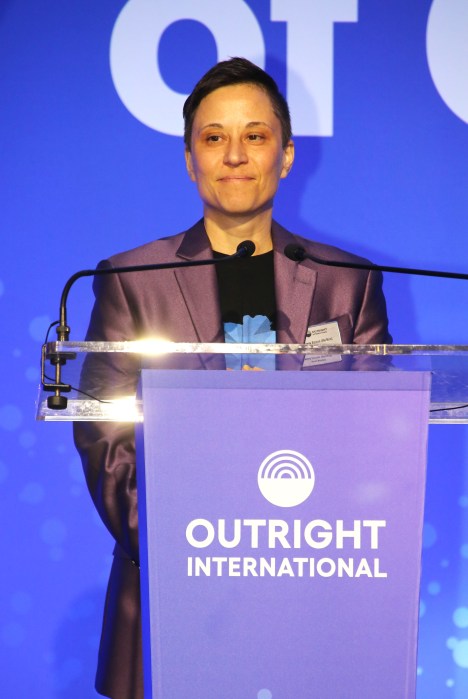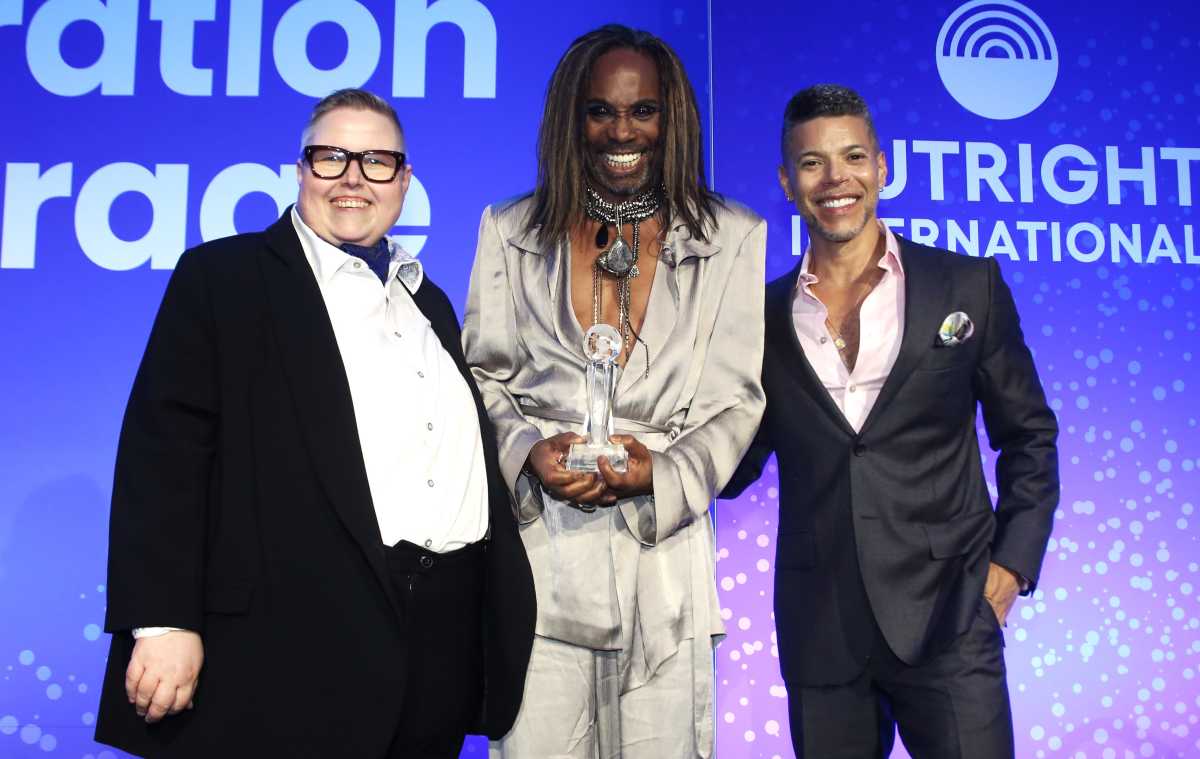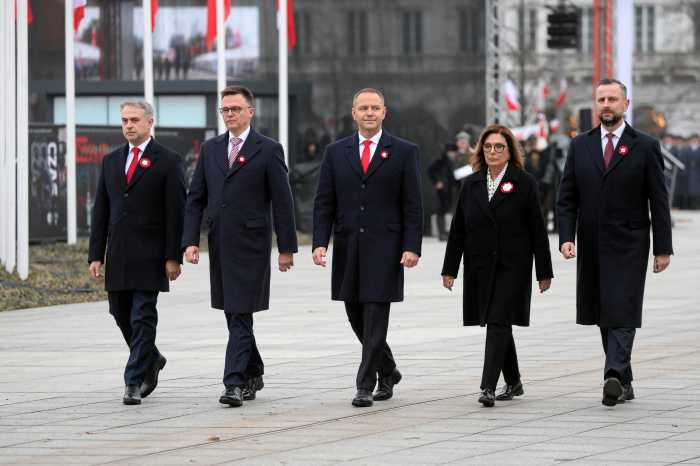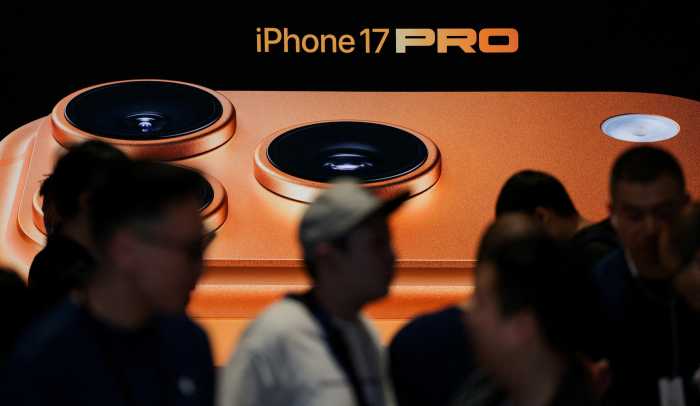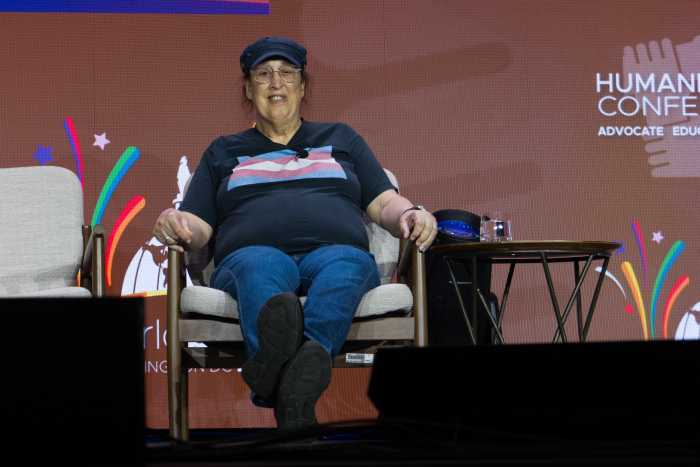Some 650 people gathered for Outright International’s Celebration of Courage Awards on June 3 at a waterfront venue at Pier 60 on New York’s west side. It was a night of glamour with a strong dose of angst thrown in. In many ways, that strange mix has long been the reason for the occasion at the Celebration of Courage Awards. The 28th annual event was held at the same venue as last year, raising about $925,000 — just shy of 2023’s million-dollar total.
Three awards would be presented: The organization Mitini Nepal received the Felipa de Souza Award for its work in the mountainous Asian country, while The Adobe Foundation, a division of Adobe, would receive the Outstanding Award, which highlights corporate social responsibility, with Amy White, global head, CSR Adobe and executive director of the Adobe Foundation, accepting it. The Outspoken Award was given to the actor, singer and talent extraordinaire Billy Porter, star of “Kinky Boots,” “Pose,” and many other shows. Porter would be presented the award by his longtime friend, Wilson Cruz, himself an ensemble recipient of the same award last year as a queer member of the cast and production team of “Star Trek: Discovery.”
Other aspects of the evening also lent a sense of déjà vu, including the return of BeBe Zahara Benet, inaugural winner of “RuPaul’s Drag Race” and star of TLC’s “Dragnificent,” who served as the hostess again.
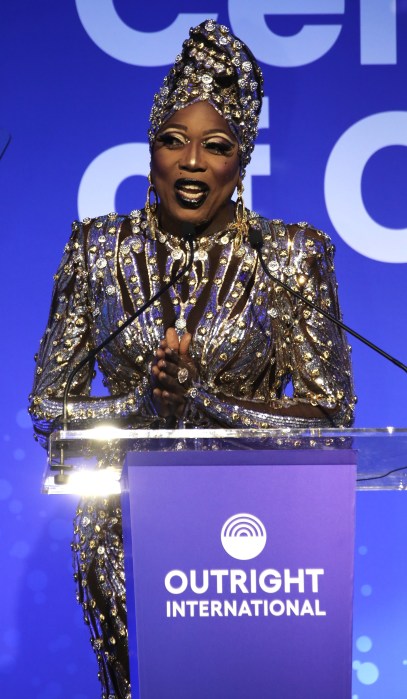
Despite the glamour — Porter himself had several assistants on hand to help with hair, clothes, and makeup on the carpet as he greeted the media — there were constant reminders of the horrific state of the world. Perhaps the most visible was the early police presence, there to constrain behind barriers a crowd that grew to perhaps 200 anti-war protestors. They reminded the glittering crowd about the bombings in Gaza, and how these now-gentrified piers the gala occupied were once the vaunted territory of trans activists like Marsha P. Johnson and Sylvia Rivera.
Protestors gave out flyers asking Outright International to take a stand for Gaza. Some were emblazoned with the slogan No Pride In Genocide over a Barbie pink watermelon slice, combining the traditional pink triangle and the symbol for Palestine, as graphics.
Pat, one of the protestors, told Gay City News, “We’re here today with NYC Dyke March and the group Butch Monthly to protest the ongoing genocide of Palestine. We’re here today to call out different queer members of our community that are not standing in solidarity with the atrocities that are happening. We’re gonna continue to show up.” Pat added that the groups wanted to also highlight “other countries that are experiencing genocide like Congo, Sudan, and Haiti.”
Inside, nods to the war were subtle, with at least one attendee wearing a black and white keffiyeh, the Arab scarf associated with Palestinian liberation. Another attendee, Aaron Hock, wore a homemade pin that said Outright Palestine. Hock was from Stand Up NYC, a group running what he described as a “drag nightlife fundraiser that supports non-profits and support trans and LGBTQ+ people across the country and in New York City.” He supported the protestors, telling Gay City News, “We have a lot of friends who are here actually protesting, with ACT UP specifically. And I think it’s right that they’re here. I think it’s great that they’re bringing attention to the platform that Outright has to be able to make change, particularly with representation in the United Nations, to bring attention to the human rights injustice that is happening in Palestine, which affects of course queer people and other people that Outright is protecting across the world.”
Hock’s conversation occurred just off the media carpet, where Julia J. from his organization was posing for photographs, along with Cruz and other celebrities.
Reflecting on what had changed in the past year, Cruz told Gay City News he was “bittersweet” about the end of “Star Trek Discovery.” Still, Cruz said, “I’m really proud of the show and its reach in the way that we’ve been able to tell queer stories in space in the future and give some people some hope through the franchise and Star Trek, which has always been hopeful.”
Thinking to current events, though, Cruz said, “We’re living in revolutionary times. And I think we are all more sensitive to international issues than we have been, than this country usually is. And so, it’s a moment that we are all reflecting on.”
He continued, as a point of clarification, “I’m just talking about the wars, I’m talking about Ukraine, I’m talking about Gaza, I’m talking about Israel, you know, all of it, you know, we’re all much more aware about the effects that this country has on international affairs.”
He then added, “It’s a tricky time. I think we are all more sensitive, more willing to speak out. More willing to educate ourselves. So, it is a different time than it was a year ago.”
It was a point that Maria Sjödin, Outright International’s executive director, would make when she took the podium, explaining, “This is a night of celebration, well-deserved celebration, I will add. I really want us to be happy and enjoy the night. But at the same time, we live in a world with more people affected by humanitarian crises than ever. Activism for a better world takes many forms, and that is a great thing. One of those forms is the protests. And some of you saw these activists on the way in. Outright supports peaceful protests without any reservation.” Sjödin’s comments received virtually unanimous applause.
Beyond those impacted by the current wars, other parts of the world were highlighted by the speakers when it was time to give out the awards. Kathy Teo, Outright board co-chair, reminded the audience of an alarming statistic. Teo said Asia contains “60% of the world’s population today, but receives only 5% of funding for LGBTIQ causes. The way to fix this is not by redistributing existing funding, but by leading the charge to increase total funding for this critical work.”
Representing Asia, members of Mitini Nepal were soon on stage to receive the Felipa de Souza Award, which goes to organizations and people making meaningful differences when it comes to LGBTQ rights. Mitini Nepal founder and president Laxmi Ghalan delivered a speech alongside Mitini Nepal’s executive director, Sarita K.C., and co-founder and board member Mira Bajracharya. Ghalan told the crowd that at times, the challenges were so great that they thought of suicide after being rejected by friends and family for coming out. Even today, 22 years after the founding of their organization, they said that people “still find it difficult to talk to us. Doctors hesitate to treat us in hospitals and government offices are still not sexual and gender friendly. We still find it difficult to rent an apartment in Kathmandu.”
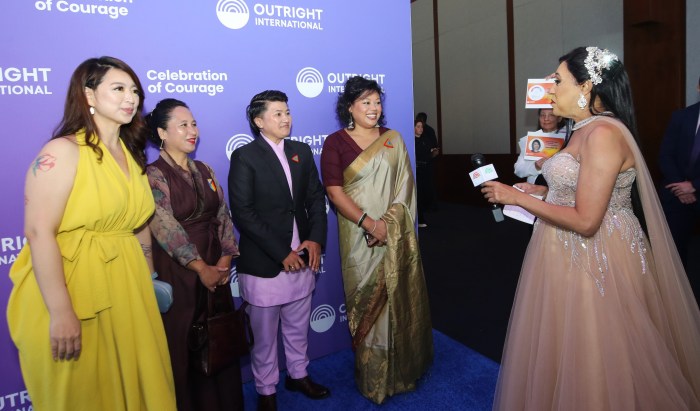
When Porter received his award, after an introduction by Cruz, he told the audience, “The best way that I can activate has always been through my heart.” He added, “When people call me courageous, I feel like it was never a choice. It never felt like courage to me in the moment.” With a voice and a stage presence, Porter mesmerized the crowd, singing from his new album, Black Mona Lisa, one of the evening’s most important high points.
Hundreds of thousands of dollars would be raised that evening by auctioneer Harry Santa-Olalla, who was also on hand last year. One of the biggest donors was Martin Dunn, a developer of affordable and supportive housing who would give more than $100,000, at times matching other people’s pledges. Dunn told Gay City News, “I’ve been involved with Outright for more than 20 years and I give to them because they have huge impact. I was raised with being told that our lives are to be in service and Outright does amazing work. So, if I want to use my resources to have huge impact, I support Outright.”
Another major highlight was when Ukrainian native Lenny Emson, Outright International’s board director, spoke of the importance of fighting for LGBTQ rights in his country despite wartime challenges. Emson said, “I’m proud of my community. And I’m proud of you all. In fact, so much of the support has come from the LGBT community itself, both in Ukraine and globally. Together, we have been able to provide ongoing assistance to LGBTQI people in Ukraine for two years and 99 days today, after the war escalated. Outright was the only international organization that applied a complex support program for all. And I want to highlight all LGBTQI anti-violence organizations in Ukraine.”
Emson went on to explain that Ukraine had a strong LGBTQ rights movement before the war, adding, “We’ll consider helping the LGBTQI community to survive and to thrive, and to fight for LGBTQI rights. Ukrainian LGBTQI activists continue to make the case why marriage rights are so important for same-sex couples in the time of war, to improve the anti-hate crimes legislation.” In other words, despite war, or perhaps because of it, the fight for LGBTQ rights was more important than ever.
Sjödin would reify this point in a conversation with Gay City News later in the evening. Sjödin said that while countries like Uganda, with its homophobic laws, garner media attention and will receive earmarked donations from the evening’s proceeds, there are other locations where LGBTQ issues fall under the radar. Sjödin mentioned, for example, “if we talk about humanitarian crisis, the country in the world with the largest number of displaced people is Sudan. And so, you know, it stands to reason that the largest the crisis in the world with the largest number of displaced queer people would be Sudan.”
It’s for this reason, Sjödin told Gay City News, that Outright is working to make the humanitarian sector “more inclusive.”
“In Ukraine, we could work with organizations that sort of pivoted and started to deliver humanitarian support, but in most places, that is not possible,” Sjödin said. “So, we need the humanitarian organizations that react when there is a crisis. We need them to become more inclusive, so that they can reach out to LGBTQI people who obviously exist everywhere, which means everywhere where there is a crisis as well.”
